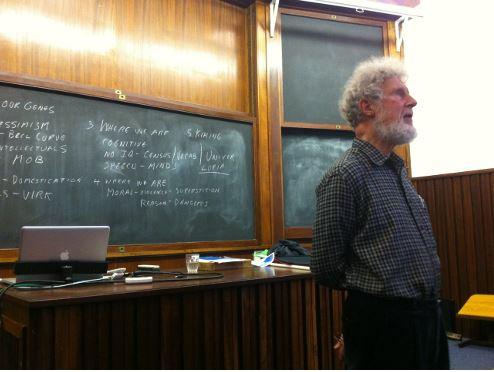
Submitted by Administrator on Mon, 23/09/2013 - 15:53
In Cambridge on Thursday 5th September 2013, Professor James Flynn reminded a packed lecture theatre that mass intelligence has been dramatically increasing since the 1930s. The societal influences to which he attributes this phenomenon, which has come to be known as ‘the Flynn effect’, include better and broader education, urban living, widespread democracy, technological progress and new industry sectors driving more complex professional services. The focus of the talk was not so much on explaining mass intellectual progress, this having been covered in detail by Prof Flynn during his last visit to the Psychology Department, but on assessing its wider implications.
Is a smarter society a more moral society? Have the masses learnt how to think like the intelligentsia, or has the way we think changed altogether? Will ‘the Flynn effect’ continue to be observed in the future or is society approaching an intellectual plateau? These and other questions emerged from Prof Flynn’s presentation of his ground-breaking research, richly illustrated with historical evidence and personal accounts. He discusses them at length in his new book, entitled "Intelligence and Human Progress: The Story of What was Hidden in our Genes" (Academic Press, 1 edition 7 Jun 2013).
Prof Flynn stressed that we should not analyse intellectual progress through the ages merely in terms of the IQ scale, identifying several problems with such an approach. For example, if we were to score society in 1900 against modern norms, the majority of the population would have an IQ of 70 (the present-day line for mental retardation). Secondly, by so doing we risk glossing over the fact that intelligence is comprised of many cognitive abilities, such as solving equations, interpreting literary works or multi-tasking. These skills are distinct and each follows its own trend through history. In all, equating intellectual progress with IQ gains can be both anachronistic and imprecise.
Prof Flynn in fact believes that, looking beyond IQ to a broader understanding of cognition, as society became more sophisticated and the average human’s capacity for analytical thought progressed, the way we think also changed. He highlighted the influence of environmental conditioning and of trends in evolutionary biology, such as alpha males becoming gradually less violent as primitive communities grew in size. In larger hunter-gatherer communities, as in the animal kingdom, it no longer made sense for the dominant male to hoard all of the spoils for himself. This would be wasteful and damaging to the community overall, as well as dangerous for the individual in that the other males could together remove him from his dominant position. Combined with females choosing to breed with less violent males, the process of natural selection began to favour the genes that coded for less violent tendencies in males.
While these evolutionary changes took effect over thousands of years, Prof Flynn adds that in the last century, society has become significantly less violent and therefore more moral. The retreat of colonialism and the marginalisation of oppressive rule, the realities of urbanisation including more frequent human contact and a greater need for cooperation, and the emergence of new industries and complex job specifications, particularly in financial services, all had some effect on humankind’s “mental artillery”.
One hopes that most, if not all, racist or nationalistic dogmas fail in the face of logical arguments, and the important point made by Professor Flynn is that these arguments, in the modern context, are based not only on concrete evidence, but also on competent use of abstractions and the hypothetical. He argued therefore that that the reasoning skills most indicative of high intelligence are also those which underpin the most effective moral arguments. Consider the example of asking a white supremacist to imagine how they would feel if they had been born black – without an ability to take the hypothetical seriously, racist prejudices are allowed to survive confrontation with logic.
The notion that mass intellectual progress furthers mass moral progress gives one good cause to be optimistic about the future of humankind, but also leaves many questions unanswered. Some of the thoughts that emerged from debate included:
- Is it always proper to equate a decrease in violent tendencies with an increase in morality in society?
- What do we think about professions that are both violent and generally practiced by people of high cognitive ability, such as military snipers or secret agents?
- What does society’s failure to deal adequately with major issues and threats to humanity, such as global warming, say about the future of mass intelligence?
- What are the changes happening in modern society that are most likely to be influential in furthering moral progress?
Report by Vesselin Popov.
23/09/13
